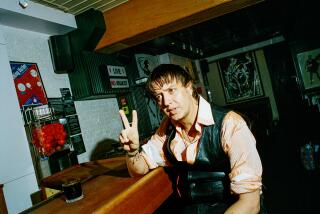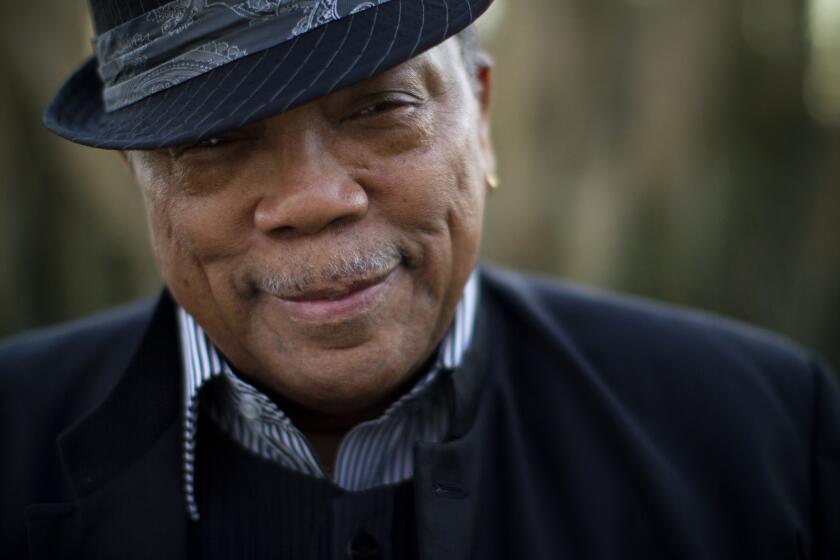Chris Holmes marches to his own extraterrestrial drummer
Assessing Chris Holmes’ place in popular music often results in cinematic comparisons. “He has a Zelig-like ability to insert himself into any event that matters,” explains Greg Kot, music critic for the Chicago Tribune. “He’s Forrest Gump for all these little subcultures,” notes Brian Liesegang, former member of alt-rock hitmakers Filter and Nine Inch Nails and Holmes’ current partner in the band Ashtar Command.
Holmes agrees. “I’ve lived my life on the sidelines of all this stuff that’s happening” he says. “I can’t go anywhere without knowing 50 people.”
Fifty very important people, likely: You may never have heard of him, but the DJ is a ubiquitous character when it comes to L.A. night life. Even Holmes admits that he’s only “famous to famous people.” He’s warmed up the crowds for a former Beatle, worked in the studio with Diddy and hosted the likes of Elijah Wood at the intimate, poolside parties he throws at the Roosevelt Hotel. He has also remained a beloved insider behind the scenes, and such respected artists as Daft Punk, Dangermouse and Radiohead’s Thom Yorke have been spotted in Holmes’ orbit.
In this same orbit also floats a number of other things that make Holmes, 39, a fascinating, hard-to-place character: There’s his obsession with UFOs and end-of-days groups like the Heaven’s Gate millennial cult, whose members, before they committed mass suicide in 1997, Holmes had interviewed extensively for a college radio show. There are his Chicago connections (Barack Obama pops up briefly) and a failed attempt at major label stardom, chronicled in a much-discussed Harper’s Magazine story. And we haven’t even gotten to his wild mop of gray-streaked hair yet.
He’s many things: a respected musician, a master networker and a wild eccentric — it’s no wonder celebrities and many musicians are drawn to his offbeat charisma and idiosyncratic-inventor vibe.
This month Holmes and Liesegang quietly put out “American Sunshine,” the first full-length Ashtar Command album, via Holmes’ Privateer label and Shepard Fairey’s Obey imprint. “American Sunshine” features a collective of musicians united by Holmes and Liesegang’s lush electronic pop. Named after the fictional intergalactic United Nations, Ashtar Command, as Holmes explains, “oversees good aliens battling evil aliens for the soul of humanity.”
Equal parts shoegaze, Pink Floyd and cosmic bubble gum, it’s probably the only album to feature L.A. pop savant Har Mar Superstar and teen sensation Taylor Hanson. “Chris is a master of time and space — Leon Russell for the new computer era,” Hanson says.
Holmes lives in a purple-and-red house on the edge of Silver Lake that contains not only his studio but a Wonka-esque world of toys that populates his creative play space — a Pac Man arcade game, a Bee Gees rhythm machine, vintage Moog synthesizers and various strange instruments. The musician’s memory flows with odd stories, and a visit prompts surprising anecdotes from his past. Pointing to a sitar leaning against the wall, he recalls a particularly unique session.
When the Warsi Brothers — legends of the Indian Qawwali music world whose family helped train superstars such as Nusrat Fateh Ali Khan — stopped by to record one of Holmes’ songs in his living room, it was the only secular music they’d ever done. “They only spoke Urdu, so we could only communicate through music,” Holmes says. “They fixed my sitars and harmoniums with toothpicks and dental floss — it was like having Jimi Hendrix tune your guitar!”
Before he was a DJ, Holmes gained notice as a performer, cutting an idiosyncratic figure in Chicago’s mid-’90s alternative-rock scene, leading the group Sabalon Glitz, a krautrock-inspired project that scored a slot at 1995’s Lollapalooza. At the time, Windy City acts like Urge Overkill and Smashing Pumpkins inspired label bidding wars. “Remember when Chicago was supposed to be the next Seattle?” Kot says. “Chris was part of that, socializing with all the key figures.”
Holmes’ next band, Yum-Yum, signed to Atlantic Records, but its sweet orchestral pop confused post-grunge audiences. The group’s major-label contract, in fact, brought nearly as much attention as the record Holmes released; it provided the fodder for “Pop Music in the Shadow of Irony,” an infamous Harper’s article by bestselling author (and Holmes’ former roommate) Thomas Frank. Frank painted Holmes as “Gatsby with an artist’s imagination and Tom Buchanan’s social credentials.” Holmes says he gave Frank the lowdown on how the industry worked, “but he just distorted things and used me as an allegory.”
After Yum-Yum, Holmes stopped releasing music for a decade, but he didn’t sit dormant: He played keyboards with the Smashing Pumpkins, performed as part of Beck’s “Record Club” project and worked with Mandy Moore, Hanson, Rachael Yamagata and Joshua Radin. Holmes also helped Chicago house music producer Felix da Housecat develop club-flavored grooves for Diddy. “Diddy would call me up and say, ‘Mad scientist, go write me some of that white-boy Human League stuff,’” Holmes recalls.
Holmes’ detours into making music for others and spinning records at parties opened new doors. “DJing is about providing a soundtrack for my friends’ lives,” Holmes says. That personal approach has paid off. Holmes now frequently spins at after-parties for Radiohead; after the band’s performance at the 2009 Grammys, he met Paul McCartney. “Paul said, ‘Who is that guy? He’s really cool,’” Nigel Godrich, who has produced music by McCartney, Radiohead and Beck, among others, recalls. “I said, ‘That’s the magic Chris Holmes,’ and gave him his number.”
“The next week, I get this call: ‘Hello, this is Nigel’s friend Paul,’” Holmes says, laughing. Opening for McCartney at Coachella 2009, the former Beatle, Brian Wilson and Jeff Lynne watched Holmes’ set up close: “I didn’t care what the 60,000 audience members thought, but I cared what they did.” Holmes continues to tour as McCartney’s official warm-up DJ; Godrich, however, says Holmes doesn’t use his notable connections for self-promotion. “He hasn’t played his music for me and doesn’t volunteer it,” Godrich says. “Chris is a freak: His intellect is quantum above what you’d normally encounter in the Hollywood scene. I always tell him he should do something on a higher level.”
That higher level just may be Ashtar Command, the vehicle that provides locus for Holmes’ otherworldly obsession: unidentified flying objects and space travel. “Chris believed the world had enough songs already about sex, drugs and rock ‘n’ roll, so he wrote music inspired by extraterrestrials,” Kot says.
Holmes’ notoriety stemmed from his weekly college-radio show devoted to UFO conspiracies. His experience interviewing the Heaven’s Gate cult members is reflected in Ashtar Command’s bizarre video for the song “Gravity”; another clip for the song “Mark IV” (produced by Daft Arts, Daft Punk’s production company) is inspired by Holmes’ training in “psychic espionage” and remote viewing with neo-gonzo author Neil Strauss.
In typical Forrest Gump fashion, Ashtar Command’s first show was a 1995 opening slot for the Chemical Brothers and featured 10 musicians playing drones on sitars, harmoniums and pump organs. Two years later Holmes and Liesegang started collaborating under the Ashtar moniker, having first met years earlier as students at the University of Chicago (at which time, Holmes lived across the street from then little-known law professor Barack Obama).
“We were both long-haired synthesizer dorks,” Liesegang says. The duo quickly placed two songs on the soundtrack for 1998’s “The Avengers” film, one of which featured Sinead O’Connor. “Somehow she got a cassette of Ashtar instrumentals,” Holmes recalls. “Then I got a weird phone call saying Sinead’s writing lyrics, and the song will appear in this movie.”
The film placement opened the door to more nontraditional avenues. Songs from “American Sunshine” appeared in commercials, video games and TV shows such as “Grey’s Anatomy” and “The O.C.” years before the album’s release.
“American Sunshine” features guest spots from, among others, Radin, Yamagata, and Z Berg of L.A. band the Like. “It’s an amazing scrapbook of all the people I’ve been working with over the years,” Holmes says, adding that the record is a “metaphor for the collective I was trying to put together — beyond the bounds of the major-label system, where people can freely collaborate.”
For example, “Save Me,” Alex Ebert’s contribution to “American Sunshine,” evolved while he lived in the coach house behind Holmes’ home studio writing songs for Edward Sharpe and the Magnetic Zeroes’ 2009 breakthrough “Up From Below.” “Having Chris next door was a grounding force,” Ebert says.
Beyond mere music, Holmes envisions Ashtar as a portal to spread ideas beyond the typical themes of popular music: as such, the group’s blog features posts topics such as quantum teleportation to visionary architect Buckminster Fuller. “If you’re a conspiracy theorist, you can choose your own adventure,” he explains.
Holmes hopes music can rewire society too. He’s music director for Art of Elysium, an arts charity for terminally ill children. Its 2010 benefit brought Talib Kweli together with the L.A. Opera for a hip-hop/classical hybrid. Holmes also co-founded the Voice Project — an initiative endorsed by Oprah Winfrey’s O Magazine that aids victims of the northern Ugandan conflict — with Hunter Heaney and Anna Gabriel, Peter Gabriel’s daughter. “We’ve been working with the United Nations to build pirate radio stations in the Congo and Uganda, broadcasting songs to the Lord’s Resistance Army soldiers with messages that their people want them to come home,” Holmes explains. “Something like 50,000 child soldiers said in exit interviews that one main reason they returned was from hearing these songs.”
Holmes’ odd trajectory has puzzled fans and critics over the years. “He seemed destined for bigger things,” Kot says. Jim DeRogatis, Kot’s fellow Chicago rock critic (and partner in the radio show “Sound Opinions”), recently blogged that “Chris Holmes ranks as the greatest squandered talent of Chicago’s alternative-rock era…”
“American Sunshine,” however, pays dividends on Holmes’ initial promise. Equally divided between classic songcraft and dreamy iconoclasm, it confirms Holmes’ musical gifts; the surprising presentation of its eclectic yet notable all-star cast in a gleefully experimental context, meanwhile, suggests Holmes’ master networking is more about subverting the system from within than an ambition to top the charts. “I’m a connector in the Malcolm Gladwell sense,” he says. “My agenda is to turn people on to good music, and make the world a better place. If you have taste, you can be the least-talented person and still change the world.”
More to Read
The biggest entertainment stories
Get our big stories about Hollywood, film, television, music, arts, culture and more right in your inbox as soon as they publish.
You may occasionally receive promotional content from the Los Angeles Times.










